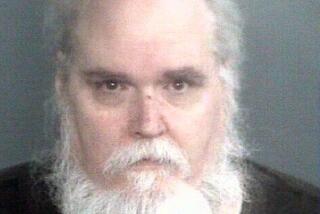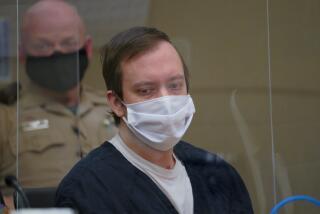Defendant in Slaying Linked to Bad Checks
- Share via
Just days before he allegedly killed Westlake nurse Kellie O’Sullivan, Mark Scott Thornton wrote a string of bad checks to raise money, bank officials testified Thursday--bolstering the prosecution theory that the defendant planned the murder and a quick getaway.
The witnesses said Thornton gained several hundred dollars and an expensive, high-frequency police radio from his illicit check-cashing activities.
Some of the checks passed by Thornton were stolen, according to the testimony, while others were written on a tapped-out account the defendant kept at Wells Fargo Bank.
In the two months before O’Sullivan was murdered, Thornton wrote as many as 63 checks that were returned for non-sufficient funds, including the one for the police scanner, said Ellen Knifsend, a Wells Fargo official.
Thornton, facing a warrant for his arrest, used the radio to monitor police activity, prosecutors have said.
He is now on trial in Ventura County Superior Court on charges of kidnaping and murdering O’Sullivan on Sept. 14, 1993, two days after the police radio was bought.
Prosecutors say the 33-year-old nurse was abducted in front of a Thousand Oaks pet store, driven to the Santa Monica Mountains in her own truck and fatally shot.
Several days before the crime, Thornton was feeling pressure to leave town because he was wanted by the police for violating his juvenile probation and harassing his former girlfriend at her yogurt-shop job, authorities say.
As part of his plans to leave Ventura County, Thornton plotted to steal a vehicle and, if the situation dictated, murder the owner, prosecutors say.
On Sept. 12, he walked into a Thousand Oaks Radio Shack and started asking about police scanners, Sean Campbell, the employee who sold him one, said on the witness stand Thursday.
Under direct examination by Deputy Dist. Atty. Michael K. Frawley, Campbell said Thornton requested “the top-of-the-line model.” After seeing one he liked, Thornton wrote a check for $375.36 to cover the price, Campbell said. On the job only four weeks, Campbell said he was delighted to make such a good sale because he earns commissions. The bigger the sale, the more money he makes, Campbell said.
Still, Campbell said Thornton made him suspicious, especially when it became clear he did not even know how to spell the name of the store. Thornton made his check payable to “Radio Shake,” Campbell said, looking at a copy of the check in court.
But Campbell said Thornton assured him he had just deposited $400 into his checking account and would have no problem covering the purchase.
But Knifsend of Wells Fargo said Thornton had not put any money in his account for four months before buying the scanner. In fact, she said, Thornton had bounced so many checks on the account that Wells Fargo eventually had to close the account and take a $510 loss.
Another way Thornton raised money in the days leading to O’Sullivan’s death was by writing checks on his landlord’s account, according to testimony. Orlando Tafurt, the landlord, testified that the night before the nurse’s killing, he confronted Thornton about stealing checks from him and his wife. A friend of Thornton’s had cashed a check for $100 on Tafurt’s account, Tafurt said.
Tafurt said Thornton ran out of the house and jumped on his bike as soon as the subject of stolen checks came up that night.
“I said, ‘Wait a minute! Mark, don’t go away!’ ” Tafurt recalled for the jury. “He didn’t listen to me. He just ran.”
Prosecutors said Thornton broke into a car that night and slept in it. The next day, they said, he killed O’Sullivan and took off in her truck.
More to Read
Sign up for Essential California
The most important California stories and recommendations in your inbox every morning.
You may occasionally receive promotional content from the Los Angeles Times.












